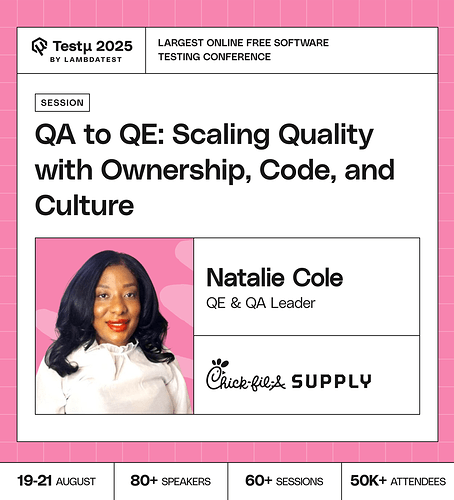Join us for QA to QE: Scaling Quality with Ownership, Code, and Culture with Natalie Cole, Quality Engineering and Assurance Leader at Chick-fil-A Supply.
Discover:
 QA vs QE – What’s the real difference?
QA vs QE – What’s the real difference?
 Inside the Quality Engine: A real-world example
Inside the Quality Engine: A real-world example
 Fusion in action: QA + QE + ML
Fusion in action: QA + QE + ML
 Building hybrid quality teams
Building hybrid quality teams
 GenAI in quality capabilities
GenAI in quality capabilities
With 15+ years of leading QA/QE teams at Fortune 100 companies and now Chick-fil-A Supply, Natalie shares practical insights, proven strategies, and the future of quality engineering in fast-paced organizations.
 Save your spot today!
Save your spot today!
What’s the hardest part about moving from QA to QE — the tech, the culture, or the mindset shift?
What measurable differences exist between the traditional QA analyst role and the modern QE role?
How can leaders foster a mindset of “quality is everyone’s job” across dev teams, reducing dependence on QA as the single source of truth?
What strategies help development teams internalize ownership of quality, rather than relying solely on QA as the gatekeeper?
What new skills should a QA learn to transition into QE?
How can orgs effectively build a sense of quality ownership within dev teams, moving beyond a traditional “QA as a gatekeeper” mentality to empower every team member to be responsible for quality?
How can QE teams better utilize data analysis and insights to make informed decisions about testing strategies, prioritize efforts, and drive continuous improvement in software quality?
How would you, as a QE, advocate for and implement a “quality is everyone’s responsibility” culture within a development team, especially when faced with tight deadlines?
As QE evolves, should we be judged more on the impact of our testing than the number of our test cases?
What happens to the definition of ‘done’ when tests can heal or adapt themselves in real time?
What is the impact of AI and agents for SRE and DevOps? Will there be new roles in markets for devops?
What are some common challenges orgs face when adopting QE practices, especially during rapid AI and automation implementation? How can these challenges be effectively addressed to make sure of a successful transition?
What’s a practical approach to scaling quality engineering practices within a growing org, factoring in team structure, resource allocation, and maintaining quality standards across multiple projects or teams?
How do you ensure that your test automation suite is not just a collection of scripts, but a valuable, trustworthy asset that provides quick, actionable feedback to developers?
What is a specific practice or ceremony you’ve implemented that was most effective at breaking down the silos between Dev and QA and fostering a true, shared ‘culture of quality’?
What specific technical skills will a QA professional prioritize acquiring to successfully transition into a Quality Engineer role, particularly looking ahead the next 2-3 years?
How can teams refactor legacy code without disrupting releases?
As teams shift from QA to QE, how can AI accelerate this cultural transformation by embedding quality ownership into developer workflows without adding friction?
What strategies have you found effective for integrating AI into QE pipelines—especially for test generation and anomaly detection?
![]() QA vs QE – What’s the real difference?
QA vs QE – What’s the real difference?![]() Inside the Quality Engine: A real-world example
Inside the Quality Engine: A real-world example![]() Fusion in action: QA + QE + ML
Fusion in action: QA + QE + ML![]() Building hybrid quality teams
Building hybrid quality teams![]() GenAI in quality capabilities
GenAI in quality capabilities